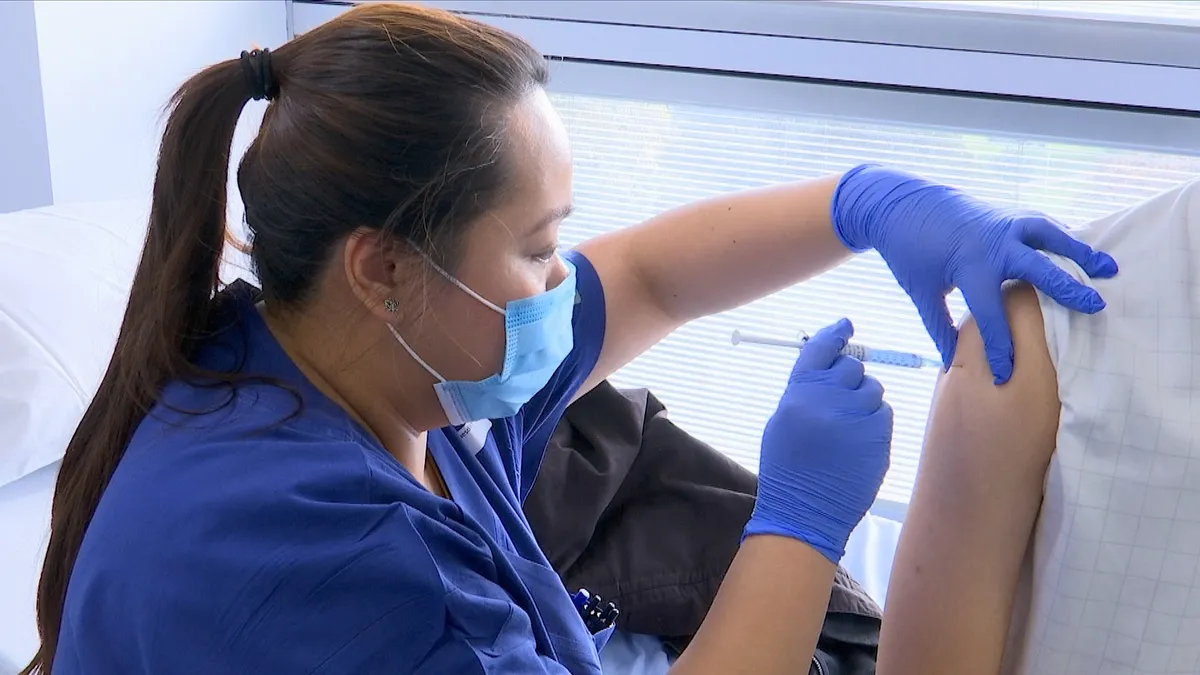Dive Brief:
- The Centers for Disease Control and Prevention (CDC) voted to recommend that frontline essential workers, as well as people age 75 and older, be next in line to receive the coronavirus vaccine. The recommendations were made by the Advisory Committee on Immunization Practices on Sunday, which voted in favor 13-1.
- ACIP voted that the roughly 30 million Americans that fall into the frontline essential workers group should be in Phase 1b. Then all other essential workers, such as those in foodservice and construction, should be in Phase 1c. If CDC Director Robert Redfield accepts the recommendation, then these groups will likely be able to get the vaccine after healthcare workers and nursing home residents, who are now being vaccinated.
- Despite the recommendation, there could still be variation in the rollout. The panel has said that these recommendations are nonbinding and intended to guide state and local health officials, and can be adjusted based on local needs.
Dive Insight:
After months of lobbying, this recommendation moves essential employers one step closer to ensuring workers will be next up for the vaccine, but it still doesn't provide a specific timeline for vaccinations.
The panel's recommendations are coming shortly after the FDA authorized Moderna's vaccine for emergency use. The first vaccine authorized, from Pfizer and BioNTech, started distribution last week. According to government projections, there are enough vaccines to inoculate 20 million people in December, 30 million in January and 50 million in February, the Wall Street Journal reported, so there is urgency on deciding priority for the next groups.
As of last week, 30 states were still developing more specific criteria for the phases, Kaiser Family Foundation reported. But this recommendation could help guide decision-making. Already, food industry trade groups, for example, are urging states to take up the panel's recommendation. Geoff Freeman, president and CEO of the Consumer Brands Association, said in a statement that the federal government has now provided clear guidance for the next round of vaccines, and will "strongly encourage" states and localities to heed it.
"As we head into the throes of winter, our industry's essential manufacturing workers must be vaccinated to ensure shelves are stocked and Americans can continue to stay home and stay safe as the country turns the corner on this life-altering pandemic," Freeman said.
Workers in the food industry, and especially in meatpacking facilities, were hit hard early in the pandemic, and despite precautions, cases continue to rise. Across the food processing, meatpacking and farming facilities, more than 77,000 workers have tested positive for the coronavirus and at least 347 have died, according to the Food and Environment Reporting Network.
The United Food and Commercial Workers International Union, which represents essential workers in grocery, meatpacking and food processing, said in a statement that this vote recognizes the "vital role these essential workers continue to serve as the pandemic worsens."
"With COVID-19 cases continuing to skyrocket, hundreds of these essential workers have already died and thousands more are infected daily as they serve our country by keeping our food supply secure," UFCW International President Marc Perrone said.
But as the food industry and others work to secure workers in the next phase in every state, there will be more questions that companies will need to answer before their vaccine rollout begins. This includes how they will distribute the vaccine to their workforces without disrupting operations, and how they will handle workers who refuse to get vaccinated. A recent global survey found that more than 61% of employees said they would get a COVID-19 vaccine if their employer recommended it. But the U.S. Equal Employment Opportunity Commission said in guidance this month that employers can largely require proof that employees have received a COVID-19 vaccine.















